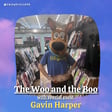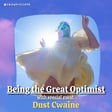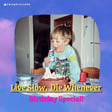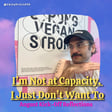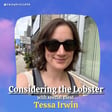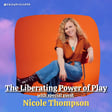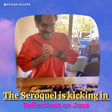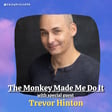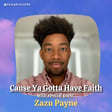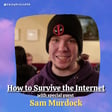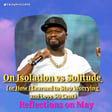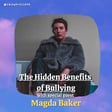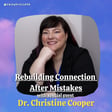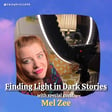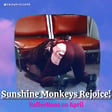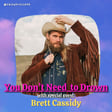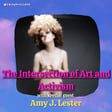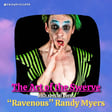Become a Creator today!Start creating today - Share your story with the world!
Start for free
00:00:00
00:00:01

Getting Dramatic (with special guest Landon Walliser)
In this very special episode of "Friendless," host James Avramenko welcomes guest Landon Walliser for a candid conversation about the complexities of the theatre industry, the challenges of regional theatre, and the importance of fair pay for artists.
They discuss their experiences on theatre boards, the impact of distance on relationships, and the anxiety caused by the pandemic.
The episode also delves into the theme of alternate realities and regrets, the significance of community, and debates over movie trilogies, and who's the James Bond.
Join in for a lively and introspective discussion that offers insights into the theatre community and personal connections.
Subscribe to the Friendless Substack
Follow Friendless on Instagram
Transcript
Introduction to Landon Wileser
00:00:08
Speaker
Well hey there sweet peas, welcome back to Friendless. I'm your pal James Avramenko, back once again with a brand new episode. This week I am joined by theater producer, treasurer, board member extraordinaire, and all-around incredible fella, Landon Wileser. I met Landon through my work in the Saskatoon theater scene, so buckle up because this episode is theater
00:00:34
Speaker
Heavy. It was an absolute treat to catch up with him, though, and I think you're gonna love this one. So for now, lean back, get comfy, set your volume at a reasonable level, and enjoy my interview with the one and only Landon Wileser here on Frontless.
00:00:48
Speaker
So this week on Friendless, I have an old friend from Saskatoon, a former board member of the SPC. I'm not even sure if you're still involved in that, we can talk about that. And all kinds of other, he's a member of all kinds of other theater communities. The one, the only, Landon Willezer. How are you today?
00:01:10
Speaker
I'm alright, James. I am anxious as ever. Otherwise, good. Anxious, anxious. Not about this. Just general anxiety. Ah, yes. Just the, like, the overall, the overhanging malaise of it all, right?
00:01:25
Speaker
Correct. So, you know, just to get kind of get the ball rolling, I always start with just like really blunt, very sledgehammering question of Landon. Who the hell are you? So I guess the best way that I would describe myself is I'm a theater artist based in Regina.
00:01:48
Speaker
For those listening, James and I have never actually met in person. That's right. Oh, my God, I didn't realize that. We were in a million meetings together for like the entirety of the pandemic, and that's how we met each other. But we have never met in person. Wow. I never even registered that. That's incredible.
Theater Career and Financial Literacy
00:02:05
Speaker
No, because when you moved from Saskatoon, my first thought was I was like, there goes the chance. Now I don't know if I'll ever see James again.
00:02:13
Speaker
crazy and what's so funny is like the moment you came on the call it was immediately so so familiar to me because this is the exact angle i've known you as like it's it's like um it's like a kids show where it's just always the exact same angle and it's just like the big friendly giant kind of thing you know
00:02:32
Speaker
It's a big comfy couch, except it's not that comfy and it's falling apart. But I guess to answer the question, I am a theatre artist based in Regina. I work primarily as a director and producer and I've kind of just been employed by a bunch of different companies. I was the intern artistic director.
00:02:54
Speaker
artistic directing intern. I can't remember how they worded it with the Globe for a while, working with the artistic director, Jennifer Bruin. I'm the producer for the women's company. I am the creative administrator for EnQ, and I am still a volunteer for the Sasklerite Center board of directors, and I am still the treasurer, although I've been trying to get out of the treasury position forever because I'm treasurer or in charge of financials for way too many things. Yeah.
00:03:22
Speaker
Well, it's so funny. I mean, I don't want to launch directly into too much theater talk, although I think that it's going to be unavoidable with you. But it's like, it was funny the experience of boards because like, treasures are so rare because so few people are
00:03:40
Speaker
financially literate in the theater world. So it's a really treasured position, very rare. You're like a shiny Pokemon. Having now had so much experience doing financials for different organizations, it also, I think, is a lot like that on my end, because I'll look at something for one organization. And I'm like, this makes complete sense to me. And then I look at something for another organization, even if I've been there for forever. And I'm like, this is gibberish. Yes.
00:04:08
Speaker
And no concept of what this is because it's just, it's, especially when it's financial speak, every time we have to do an audit or I have to work with an auditor, I'm like, I can give you all the info I have. But like, if you tell me something in auditor language, I'm not, I have literally what you're talking about. You need to explain it to me in the most basic terms. Oh yeah. I used to always feel so bad when, when I worked for the SPC, I always felt so bad because whenever financial stuff would come up and we would either talk, we'd be talking to the,
00:04:38
Speaker
the first account we had or the new ones and they would be asking me this stuff and I would just be like, well, this is the file I have. I have no idea. I wish I could help you, but this is what I have. These are numbers and they're terrifying to me.
00:04:59
Speaker
The thing I've established is even people who think they know what's going on in the arts, though, if they're not accountants, it seems that they really just don't know.
Stepping Away from Theater
00:05:06
Speaker
I had someone who has done it for years, very experienced, who was like, I want this kind of report. And I was like, great. Went, learned how to do that report for them, started giving that report for the monthly check-in with them. And they were like, this isn't what I want at all. I want this other thing. And I'm like, that is not even functionally the same as what you have asked for. Yeah.
00:05:29
Speaker
It's the strangest thing. Well, the whole board system. I mean, I just everything, you know, so so to give you a little context for myself, just because like we haven't spoken in like two years, like I I have like no contact whatsoever with theater. I'm just like completely fundamentally out of it.
00:05:50
Speaker
Yeah, no, I'm just like, I was just done. And so it's so funny, like reconnecting with theater people because in some ways it feels like, how do I put this like without sounding like a dickhead? It's like, in some ways it feels like I've been kind of like deprogrammed from the cult, you know? And I sort of like, I look back. I feel like that woman who does that like going clear documentary, you know, who's- Yeah, we are women.
00:06:20
Speaker
Thank you, yes. And I hear about the problems and I'm like, that's nuts. You should just get a job. It's not fucking worth it. It's just not worth it at all. And hearing how many different responsibilities you hold in the community, it just sounds so like my heart immediately starts racing. How do you hold that stuff down? How do you hold it together?
00:06:45
Speaker
Um, I honestly don't really know because like I'm not, I'm not a drinker really, uh, outside of socially. I do take, um, CBD as anxiety medication, but my anxiety is completely not related to my job. Right. Um, at least in any sort of like main way. I'm sure it is based on a stress way, but yeah.
00:07:08
Speaker
I don't know. Like, and it's one of those weird things because me and as you know, my brother and my sister are also theater people. We all work in kind of similar streams of it, as well as like kind of our individual streams. Like Rachel and Carson both do costume. I don't really do costume, but Carson also kind of does directing. Carson and Rachel do writing.
00:07:31
Speaker
And it comes and goes and waves a lot of the time. It's fine. There's some days where I think with any kind of art form where you just want to be done with it. It's so hard to feel like sticking with it because you're not getting the projects off the ground that you want to get off the ground, or you're not getting the funding for whatever.
00:07:54
Speaker
But no, I do think it is, I think most things kind of have that cult speak when you get into them far enough. Any kind of job where there's like a culture around it too has that. And the arts in particular, because they're also like, they have their own kind of funding model, especially in Canada. It's very difficult to not get sucked into like the culture of the work.
Theater Boards and Dynamics
00:08:18
Speaker
Well, what was strange for me, forgive me, I'm not trying to like do some kind of like gotcha journalism here, but it's just like, but it's just, you know, to me, it's really interesting to be able to talk to someone like you because you have, you have experience on both sides of the stage, which is something that I really value. And not everyone in the community does have that experience between like doing the creative side, but also the administrative side.
00:08:41
Speaker
And it's sometimes really hard to discuss the logistics of how a theater organization genuinely runs with people who only do the creative side because a lot of times there's this attitude of like, well, that doesn't make sense, just don't do that. And it's like, no, you fundamentally have no idea how a board works or like how like a not-for-profit works, you know? And so it's like, that's just not, that's not possible. And that's fucked, you know? You're right, it should work better, but it doesn't. And, you know,
00:09:12
Speaker
the way I think creatives attack the problem doesn't often actually solve the grander problem of the system. No, it doesn't. And I think there's also like there's a really kind of unique issue in my mind of
00:09:26
Speaker
Saskatchewan for sure, but I think probably it extends across the prairies more generally because we have so few kind of like larger scale theaters where there is also just this kind of like inherent lack of experience in working in like larger scale professional theater. And so when you start getting groups that are kind of moving into that,
00:09:46
Speaker
of their own accord for whatever reason, the problems become incredibly clear, either because they don't know roughly how a professional organization should run or how they would organize something, but also because there's inherent flaws in the professional system that don't really match up with some of these things that you need them to match up with when you're working with community groups or grassroots groups.
00:10:12
Speaker
So let's take it back a little bit though, because I wanna, you know, I'd love to figure out what got you to, you know, what got you to the dance in terms of like, when you joined the SPC board, like where did your sort of, where did this, how do I put it? Who hurt you, you know?
00:10:38
Speaker
Where did this anxious attachment to theater come from?
00:10:44
Speaker
I mean, I'd been doing theater for a long time by the time I joined the board. I had done theater pretty much since I was 13 in one way or another. Mostly that obviously from the time you're 13 is like through school, but I also did
Journey into Theater and Board Experiences
00:11:02
Speaker
it through a couple of like summer programs and things like that. And then I went to university and I originally was not enrolled in theater. I was enrolled in,
00:11:10
Speaker
education for like one very sad week that I did not attend classes this was before actual semester had started I was in education because I was just like oh like that'll be a good safety net and then I had the enrollment letter for like a week and I was like I absolutely do not want to do that um and then switched into the film program I did the whole the film program for my whole first semester and I did really like it um
00:11:37
Speaker
but it wasn't teaching the things I really wanted to learn.
00:11:41
Speaker
It was a lot of technical stuff around how cameras work, how to frame shots, which was stuff that I had more experience in and was relatively comfortable learning outside of a classroom. And the things that I wanted to learn in the classroom, like how to direct actors, like the fundamentals of storytelling and script development, stuff like that, that I felt was really good to learn with another person or with a group of people, was not what they focus on in the first year of film at the University of Regina.
00:12:11
Speaker
Sure. Or they didn't at the time. This was 10 years ago.
00:12:16
Speaker
So went into the theater department, did theater for my whole degree, finished my theater degree in 2016. And then I was working on a show that we toured for a couple of years, kind of came back. There was this big kind of call to action from the Regina community shortly after we got back from that tour because nobody was getting professional jobs here. So people were kind of stuck in this limbo between
00:12:42
Speaker
vocational and avocational theater even if they had been trained in you know pretty much every way shape or form you could be trained for a vocation in theater they just weren't getting work here um and so there was this big kind of like call to action from the community around how can we change that where are the problems what's going on and then covid happened yes and so i joined the board in the middle of covid because i got a call from a professor that i used to work with who
00:13:09
Speaker
basically said, we need people on the board. And I said, sure, because there was nothing else going on for theater at the time. And you've never been able to shake free sense, eh? Not since. Technically based on board terms, I'm probably supposed to be ending after this year. It should be like a bigger term. Right.
00:13:29
Speaker
But you were there for most of it. So we had some fun adventures. We got some great money. The Digital Now grant that you wrote is just finishing up now. We filmed a bunch of shows. So we're going to have a little spring fest of new work. Amazing. Yeah. What is the experience like on your end?
00:13:55
Speaker
as a board member because it strikes me as just such a bizarre it's like it's like this weird you have like the boards have like too much power in not-for-profit organizations as I see it but they also like are usually
00:14:11
Speaker
volunteers so it's this really bizarre push-pull of like no one on the board really wants to do anything but they also are sort of technically the ones in like they're the shadowy back room of theater you know and and I'm curious what your what your experience has been like in you know it as much as I guess you're comfortable to talk about because maybe you don't want to be like you know well I've said before I've kind of also I'm on enough boards or have a moment with enough boards that I can talk about them pretty freely
00:14:39
Speaker
because there's like four or five that I have involvement with or have had involvement with over the years. And it really kind of has varied. I was on a board when I was first in university for a while, which functioned really well. It was actually a really great board. And then my partner at the time,
00:15:01
Speaker
cheated on me with the board chair. So that fell apart. Fabulous. But of the ones I'm currently on,
00:15:13
Speaker
It's really varied. Some are organizations where they don't have enough funding to do what they want to do. There needs to be a lot of help from the boards. The board's always stepping up to the plate, always trying to find funding, get things to a place where they're able to function as day-to-day operations.
00:15:33
Speaker
And then there's others where I'm answering to a board or I'm in a kind of member at large capacity. And those boards are usually larger and more well established, not always, but usually more well established, which I think are obviously a lot nicer to be on. They're a lot less stressful to be on.
00:15:56
Speaker
But at the same time, you usually have a lot higher level of responsibility. There's usually a lot more oversight. And or a lot more disagreement among the members of those types of boards. Sure. I guess when you're the board of an organization that has one employee, it's a little different than an actual company.
00:16:17
Speaker
With ONCUE like now it's weird because I was on the board basically as a volunteer co-creator of the organization and now I am the employee so I answer to the steering committee they don't call themselves a board. Gotcha. Yeah so that's fun because then there's also a different side of that because I am the only employee of a larger organization.
00:16:43
Speaker
You know, the real roots of this whole project is the exploration of friendship and intimacy and connection and all these kinds of that whole cloud of sentiments.
Friendship and Relationships
00:16:55
Speaker
And, you know, at the end of the day, it really boils down to the question of what it means to be a friend and realizing that what a lofty and
00:17:02
Speaker
open-ended question that is I love putting it to guests to kind of get their personal interpretations on it so that's where I'll start is to you what does it mean to be a friend
00:17:15
Speaker
So when I looked over this, when you sent it several weeks ago and you kind of sent the introductory package, I was thinking about it a lot. And I think what I kind of boiled it down to, in my head at least, is that it's someone who can be there for you. And there's obviously various shades of what that means. There's various kind of levels and shades of friendship.
00:17:35
Speaker
like you there's best friends who you would tell anything to but you know that you probably can't be there for each other all the time for you know one reason or another but you would tell them anything and there's friends that you would always be there for it even if you might not tell them everything and you might call them your best friend there's like there's just so many shades and kind of
00:17:52
Speaker
uh gradations of like what friendship means but it kind of to me always boils down to that you're there for each other in some way do you find yourself are you someone um are you someone who everyone's your best friend or you have no best friends uh because i find everyone is no best friends yeah okay i would say i have a few kind of like best friends but they tend to be people i've known for a very long time um and they have like
00:18:24
Speaker
It's kind of like the final girl because it's one little stage of my life where that one person is the only one who makes it out as my friend. And then we stay friends for a very long time. But they always die in the sequel, you know?
00:18:43
Speaker
I have a snake here wearing my Jason Voorhees cardigan. But yeah, so I have a best friend that I've known since preschool. And we barely speak to each other just because of our lives being like that. But if she's in town, we always try to see each other. And then I have a best friend from high school who we usually talk every day.
00:19:09
Speaker
like, we usually text every day, I should say, we don't usually talk every day, but we text every day. And then like, obviously, like my partner is my best friend. Yeah. And like, my brother and my sister and like, my family are all like different kind of levels of best friend. But
00:19:31
Speaker
yeah it really it really depends like i can think of kind of like one person from each kind of little stage of my life there's one person from elementary school is one person from middle school one person from high school one person from university and then otherwise it's like my family or my partner yeah i love that you know i i envy i think i don't know if envy is the right word but like you know my family
00:19:54
Speaker
You know, bless them. They all live on the other side of the country, right? You know, like, they're all in, like, Nova Scotia. And so it's, like, really difficult to be close with my family, you know? And I find myself, yeah, I guess I do come back to the word envious of people who have family nearby who can have those strong ties, you know?
00:20:15
Speaker
I oscillate all the time between valuing chosen family over blood family. But I think having that option is something that I think is a really beautiful opportunity in someone's life. And also, I mean, obviously, I've met your sister. I've never met your brother. But seeing the bond that you had is something that's really like, what's the word for it? It looks like something that I wish I had, right? Yeah.
00:20:45
Speaker
Yeah, and thankfully, I didn't have to do that kind of long distance family relationship for a long time. It's only been kind of in the last few years where my brother, because we all ended up going to school in Regina, so we would be living together here. And then my brother ended up going to do another degree program or a certificate program, I think, at Grant McEwen. And then his partner got into a school in Vancouver, so now he's in Vancouver. Gotcha.
00:21:14
Speaker
So now we do have to function in a very different way. And I think the only thing that's made it slightly easier is that my partner for so long was also in the UK. So my family was all here and we were all very close, kind of geographically, at the very least within a few hours of each other.
00:21:30
Speaker
if not literally in the next room, but he was eight hours away and now he's here full time. Okay, so we did get through because I remember, I remember especially during the, because obviously during the pandemic, he was like basically locked out. And I remember there was all kinds of drama going on about like him coming in, but like maybe not necessarily even being able to get into the country. And like that all kind of got settled through.
00:21:54
Speaker
I mean, kind of. So we put in his application during the pandemic. That all happened. He got his permanent residency and was able to come over at the beginning of 2022. He still has not received his PR card, which we've been dealing with. That's a novel nightmare. But he has his permanent residency. He just doesn't have the card. Right. Because it never showed up and we put in requests and then they never get answered and then they answer them and they just close them. And it's nonsense.
00:22:24
Speaker
But yes, he's here. Yeah, that was that was a nightmare. The two years like we just we had no idea when we'd be able to see each other again. Yeah, horrendous. How did you and how did you meet him?
Challenges of Pandemic Relationships
00:22:40
Speaker
We met online, actually, and not through like a dating app or anything.
00:22:45
Speaker
Back in late 2013, really early 2014, he used to blog a lot and he had done a blog post about his coming out story and I had responded to it and we just started chatting and that was kind of it.
00:23:02
Speaker
adorable and had you ever had you ever met in person before him coming like through the pandemic or or yeah okay okay yeah no no we had met multiple times he had lived here before um he was locked up during the pandemic so he came here in 2014 about six months after remap for two weeks um and then came back
00:23:24
Speaker
in 2015 for another two weeks, which was a lot less fun. I was miserably sick during that one. I had bronchitis. Great time for that. And then in 2016, I went over there for two weeks to meet his family. And then 2017, he came over for six months on a visitor's like tourist visa. And then he came back
00:23:50
Speaker
and then
00:24:09
Speaker
You know, it's moments like that where I was just like, oh, fuck, it opened the borders, you know? Because so much of me was like, lock it down, JT. Like, who cares? Fuck of all. And then I'd be like, OK, except you can let him through. You know, like it was so bad because he and his and a couple of members of his family are like severely osmatic. So because it was a fucking like
00:24:38
Speaker
The word is completely escaping, but because it was an illness that was affecting lungs, I was like, it was never ending anxiety. I can't even tell you how bad the anxiety was when I would leave some of those Zoom meetings with you because I'm like, there were games where I was literally just like lying in bed hyperventilating. Yeah. Oh, man. Well, God, and it's like it's not like it was better being in the UK, you know? No.
00:25:09
Speaker
No, and like they were in the middle of Brexit. Oh god. Oh god. Everything was a nightmare. What is something you miss about not seeing each other as often as we used to?
00:25:36
Speaker
keeping in mind, we never met in person. But we know, well, that's honestly the thing, that's the thing that kind of just boggled my mind when you mentioned that. Because yeah, we were talking, if not almost every day, like every week, no question, you know? Well, I'm like, and there were several times where a meeting would end and you and I would just stay on and
00:25:57
Speaker
Well, and that was, you know, when I think about that, I think that's because, you know, I'm trying really hard not to default to like nothing because it's like, it wasn't, it wasn't bad at all. You know what I mean? It wasn't bad at all. But like my impulse just like, because like my experience with SPC sucks, you know, just to be like honest about that. But like, but what I really appreciated
00:26:18
Speaker
about you was exactly what you brought up which is that like we would end up chatting sometimes for a couple hours afterwards and we would just be and we would just shoot the shit and it was just like we talked video games and movies and like and it was really like that was such a comfort to me you know and and was just such a relief and a bit of a release you know in that it was like
00:26:39
Speaker
Cause those meetings could be so weird sometimes and so loaded and so like unnecessarily stressful for like what we were doing. And, and then we'd sort of end the meeting and I would feel so like weird and janky and, and, and then, you know, we would just talk about horror movies or we would talk about, you know, something like that. And it was like, that one time I remember that.
00:27:02
Speaker
Yes, right. Exactly. Exactly. Right. You know. And so, yeah, that was the stuff that I really, you know, and and and throughout it all, like I really appreciated you being on the board because I knew no matter how weird it was going to get and the like on camera meetings that you would have and all this stuff, I always knew that like I was never going to. How do I put it? It's like it's not like
00:27:31
Speaker
How do I say this? It was just comforting to know I could look over at least to you and be like, there's at least somebody who may not agree with me 100%, but isn't gonna just like- But it's gonna respect you as a person. Exactly, exactly, right? Yeah, thanks for putting it like that, because it's exactly right. Yeah, I didn't need you to blindly support me, but it was just nice to know I wasn't just me against the whole board. And that was definitely a comfort for me.
00:27:59
Speaker
Oh, that's nice. Yeah, I miss. I know. I know it wasn't a great time for you for like a myriad of reasons, but I'm like, it felt so much.
00:28:09
Speaker
more fun I think to have you. That's not like fun in other ways now but I'm like I think like you and I did vibe in a way that I don't think I have with a lot of people that I've been on boards with. Even though you know you weren't a board member it was like it was it was just great to like listen to what you wanted to talk about. I thought you had such great ideas that you always brought to the table. I liked that you and I had kind of the same
00:28:37
Speaker
type of ideas, I guess, in that, although we were like kind of working in the sphere of theater, we also like to think more on traditionally, like we talked about like, how can you integrate podcasts? How can you integrate publishing? How can you integrate all of these things into this kind of like, especially in Saskatchewan, I think very siloed off community. Exactly. Doesn't interact with these other art forms.
Critique of Theater Community
00:28:58
Speaker
Yeah.
00:28:59
Speaker
Well, and that, I think, was always at the root of so many of my frustrations with the theater community in general, was that I was like, you know, to me, the spirit of theater is movement. It's not about, like, I never understood the sort of, like, Well, okay, thank you, exactly. That's exactly the other side of it. But, because, like, to me, I never understood the sort of, like, idealization of, like, the regional theaters or, like, the desire for these big contracts when it was, like,
00:29:27
Speaker
like the purpose of the regional theater system was for for plays to travel through them. It was so that there was theaters in every city as they traveled and and you knew you would have lighting and a stage and you know and so it was like it was built for for a tour it wasn't built for you know for locals to work and so I I never I could never compute the like the
00:29:49
Speaker
the vitriol and the resentment and then the entitlement for locals to desire these contracts when it was like, no, make a play and go put it on in Winnipeg or go put it on in Halifax or something. Those aren't really for you.
00:30:09
Speaker
It's one of the frustrations I have, not just with Saskatchewan, but with regional theater attitudes in general. It's why I see that whole system as fundamentally broken from what it was intended to be, because all of theater has become so stagnant and so siloed. And the way that it breaks up is by doing things like experimenting with new mediums and experimenting with what can cross over.
00:30:37
Speaker
you know theater is a fundamentally unique type of experience in that like if you have a story that works better as a as a movie like you should just go make that movie you shouldn't bother putting it on stage you know like like but but that doesn't mean that there aren't elements that can be incorporated from film or from digital media of any kind onto the stage and create a new experience you know and I yeah I just never understood the like yeah that sort of that
00:31:08
Speaker
I loved, you know, the siloing and the sort of like, but it was like, it was like a self-imposed isolation, you know? Yeah. And I'm like, it's, it's strange. I don't know if I fully agree with you about the regional theater thing. Cause I do think that part of that, like the mandate of any sort of organization like that should be to provide opportunities for artists so that they can step up to that kind of level. Sure. But I agree. Like it's not like, there's not, there shouldn't be an entitlement to it. There should be, um,
00:31:36
Speaker
that kind of like built into the mandate and that I do think that there is more of a shift in that happening here, at least I can't speak for elsewhere that I've been liking.
00:31:46
Speaker
But at the same time, they're like the regional theater kind of system is not going to be the most flexible system. They have like the between the boards that they answer to the funders that they answer to. They are not the places that can often do a lot of the experimentation that you're seeing from like the independent artists. The independent artists aren't getting money from funders because the funders are busy funding the regional theaters. And it's just it's a vicious cycle.
00:32:11
Speaker
Oh, the whole, like, the arabarose of theater funding is, like, vulgar, you know, in my eyes. What I mean about the regional stuff is that, like, the concepts, you know, as I vaguely remember it from, like, theater history when I took it in, like, 2007, was that, like, you know, the intention was to have places to tour theater, to tour plays. And to me, like,
00:32:41
Speaker
what I would posit would be that like, those theaters should be creating systems to make it easier for artists around the country to be considered for roles in all the theaters, not just the local theater. No, and that's, I agree with. Like it should be like, when you're looking at the kind of like regional theater, it shouldn't be this one regional theater should be providing all these opportunities. It should be this one is providing an opportunity for people to step up and get into that system. Exactly.
Funding and Opportunities in Theater
00:33:08
Speaker
Exactly. And like, you know,
00:33:09
Speaker
you know in ideal world there's still going to be too many actors not enough part there always is people want to be actors yeah um but yeah like the like the opportunity for training and for experience that type of thing to me is the more important kind of like
00:33:25
Speaker
note to hit there but yes I always appreciated your like unique take on something because yeah it's fun and I don't feel like a lot of people always are able to bring something like that to the table totally well and it was you know and I don't say this with I'm sure this will come out sounding wrong but it was like my experience in this in the Saskatoon community was that it was like
00:33:47
Speaker
it was almost like people would like go and spend like a summer in Toronto and like never book a part and then come back and just live forever in Saskatoon and like think that that was their like rum springer or something you know and and that was sort of like
00:34:04
Speaker
It was sort of like all the like worldly experience they ever needed, you know, and there was just a very, there was a really entrenched lack of curiosity about stepping out of the community that I never really understood, you know, and having come into it from outside and having lived in multiple parts of the country and having worked in multiple parts of the country.
00:34:25
Speaker
I couldn't understand the stubbornness of that's not how we do things around here. And it's like, well, what you do sucks. So people are always asked if I start working with someone who is a very established professional, why are you still working here?
00:34:50
Speaker
Especially with the type of work you do, it's just not the type of work that's usually done here. And I'm like, because I can't afford to go anywhere else. So I have to wait there. And big time. Yeah. I've been to England. I've seen lots of shows in England. I've seen lots of shows in New York and Toronto. Actually, the only place I don't think I have seen a show is Vancouver. No, I have seen them on a Vancouver. I saw an opera in Vancouver. Oh, cool.
00:35:15
Speaker
But I'm like, I like I've done a lot of things. I like to see shows everywhere. I would like to work in more places, but I'm just like the financial reality of that is also just like.
00:35:24
Speaker
that's exactly right yeah yeah well and that's i mean and that's the other side of it and i think that that's one of the failings of the like i think that's one of the things that the the you know whether it's the regional theater system or whatever whoever it is at that tier i think that's one of their failings in terms of building up the network nationally is that like
00:35:46
Speaker
they've dropped the ball in creating opportunities for artists to actually be able to feasibly travel in a way that hasn't been possible since the fucking 1970s, you know? And so it's just, you know, they've, you know, you talked about like they've just hovered up all the funding, you know, like there are theaters that I've worked at where like,
00:36:06
Speaker
are getting hundreds of thousands of dollars a year from Canada Council. And if you look at the budget, not a penny of it even makes it past the head office. It doesn't even make it to the stage because of the exorbitant salaries and all the shit that's going on. So it's like, I don't even know how they're funding these plays because all the money is going in the pockets of the administrators. And so that's a fundamental failure
00:36:32
Speaker
in terms of what that theater is supposed to be doing for its community. Yeah, and thankfully I've been lucky enough.
00:36:40
Speaker
I think over the last year I've worked with a lot of either people who are like really kind of devoted to like the indie theater scene. I don't like I don't care if you actually had ever met Jennifer when she took over at the Globe as the 80. We'd like emailed between each other. Like Jennifer is like interest and experience is so heavily rooted in that kind of like indie theater scene.
00:37:03
Speaker
which I think is really interesting because it's such a unique perspective for someone who is working at a theater at that level. But then like just this last year, like working as the like Saskatchewan producer for Riser, which is a co-production with why not theater. Like the people at why not theater are also like everything they do there is this kind of like indie productions that are coming up through that system. And their whole like purpose is these kinds of new artists and new productions that they're providing platforms for. And it's just really interesting because all of these things that we've kind of been working towards
00:37:31
Speaker
that like our projects you never hear about in the regular kind of theater community I think here like we still I keep trying to explain to people like that riser is specifically targeted to people who are in that kind of like
00:37:47
Speaker
weird in between of being emerging artists who have never had a professional gig doing something at a professional grade and sure enough like we had artists who were applying for funding from Canada Council this year and because they were being undersigned by like why not theater they're getting $60,000 for an independent production and I'm like that's incredible to me yeah fuck yeah
00:38:11
Speaker
for these little indie shows that are running for 10 performances here. But now, finally, everyone's being paid. And everyone's being paid equity wages. And it's like, great. That's what we want. Yeah. Oh, God, and equity. And it's so funny how it's like, we're all fighting tooth and nail for equity wages, which are still fucking nuts. You think about what a stage manager is being paid
00:38:35
Speaker
by equity rates and like the argument of like you're working six days a week, crazy fucking hours. And then it's like it's for tooth and nail for like thirty thousand dollars a year, you know, and it's just like and that's all they're demanding. You know, like you look at like the writer's strike going on and it's like the writer's strike at the oh my God, the strikes in the states, the the whole AI acting thing. Yeah, I can't even get into. Yeah.
00:39:05
Speaker
the nonsense that is just coming out like I think Fran Drescher did one of the interviews that she did talking about um the actors union and she was just like
00:39:16
Speaker
Like these aren't people anymore. Like some of these executives are proposing these ideas are like just so fundamentally detached from the reality of just being a working person. But it never enters their mind that, you know, having someone come in, you scan them and you pay them for one day and replace them with an AI background person like. That's a human. That's a human. That was a person who should have been paid daily for their work. Yeah.
00:39:44
Speaker
but it goes into their pockets, and so what do they care, you know? You know, that, once again, I'm trying to like, we gotta keep our heads up, right?
Community Dynamics: Theater vs Queer Communities
00:39:55
Speaker
Well, you know, we'll keep on dipping our toes back in, but we gotta kind of break it up a little bit. I mean, inevitably this question is gonna probably loop us into a little, you know, what's the equivalent of like a theater K-hole, you know, a little T-hole, but,
00:40:11
Speaker
You know, one of the new questions I've been incorporating this season is this question of community, you know, if friendship is like a bond between like kind of a one on one, then, you know, community is the sort of expansion of that, you know, and and again, as I've been. Caveating with all the questions this season, is that like.
00:40:29
Speaker
It's one of those words where when I hear it, there's sort of like a pragmatic, you know, obvious definition. And then there's this much more nebulous kind of almost like emotional definition within myself. And and I'm really curious what I guess to start with, like, what does community mean to you?
00:40:48
Speaker
this was the one I had a harder time with when I was looking at because like the kind of like the I guess knee-jerk reaction answer that I had was basically the same as the friendship one that it's kind of like a group of people who are there for each other you know to whatever extent as much as they can but then
00:41:07
Speaker
I agree, there's a more interesting kind of nebulous definition of it, because the first thing that came to my mind was the queer community, which at least for the most part seems to be relatively united on a lot of things. But then you start delving into that, pulling at threads in that, and that falls apart. That certainly causes some wrinkles pretty quickly. But the thing that really caused the wrinkle was when I was like, yeah, the theater community, we can talk about the theater community here.
00:41:34
Speaker
that is a big thread to pull because as we've kind of like mentioned in the other discussions like
00:41:42
Speaker
things are so siloed off in like, at least where we've been working that like you remove one of those threads in the theater community. You might not even notice because you've never worked with those people and you are like, we're likely to never work with those people. Yeah. And so it means nothing in the end, unless you put up a United front for something against something. Um,
00:42:07
Speaker
I mean, I would kind of posit that there is no theater community, you know, at least on the on the sort of like municipal level of most cities I've worked in. There is no theater community. There's there's theaters, you know, but I don't I've never seen it as a full united community, you know. And that might be it is that we just we say it's a community, but we don't really have any of the sort of like kind of functional things. I'd be interested to know what the kind of like, you know, checklist is for things that would make up a community.
00:42:35
Speaker
People are able to meet that.
00:42:38
Speaker
That's an interesting question, actually. I've yet to really formulate a genuine sort of tangible definition for myself. I think I have sort of strands of stuff that I'm forming. I really like what you talk about about the idea of having each other's back. When I observe communities in the world, I was framing it the other day in another interview about how
00:43:05
Speaker
Like when you think about people you disagree with, you know, and you talk about like their politics, you talk about their culture or something like this. What I think a lot of people fail to remember is that these are these are people who are, you know,
00:43:22
Speaker
very likely rooting themselves in fear, and that fear is for the protection of their group. They have a shared identity signifier, whatever it might be. Maybe it's that we all believe in the same book, or we all believe in the same old man. I don't know. They found some kind of totem to unite them, and that has created a sort of
00:43:51
Speaker
some might call it a pseudo community, some might call it a genuine community, but either way, the manifestation's the same in that they are willing to defend it, right? And I might not necessarily agree with the intention behind it, but that is a form of community. And so I think that there's a united
00:44:12
Speaker
something outside of you that I think is one of the sort of like pins of a community, you know, whether it's, you know, Star Wars or politics or whatever it might be, right? Yeah. And like the reason that the queer community had come to my head first was not particularly because I'm super involved in the queer community here and used to be more involved, but just, you know, by virtue of work have not been. But like, I know, I don't know how much you followed Saskatchewan politics.
00:44:42
Speaker
um this past um some motions about education and now uh children will be forcibly outed to their parents and all of the like traditional kind of anti-trans bullshit that's happened in the states has been hauled up to Saskatchewan now called to New Brunswick
00:45:05
Speaker
um but like when you had originally kind of sent the questions like they were just getting ready to do their big um protest in front of the legislature here and so that was the first thing that had come to mind yeah um
00:45:18
Speaker
And I was like, that, that to me is a really good kind of encapsulation of community, because I don't know, once again, in kind of my own head, comparing the theater community versus the queer community, I don't know if I would ever see a theater community do something even close to that here, because I don't know if I would actually define this as a community in a functional way.
00:45:36
Speaker
Well, it would be self-serving in some way, you know what I mean? People would get involved if it benefited them, which is a difference, you know? And I think that's another element of communities that I observe in terms of like a healthy functioning community is someone who sort of has almost like a greater cause beyond just them, you know? It's something I don't personally like...
00:45:58
Speaker
I don't like the concept of fighting for something because I vote, you know, and I recognize that the holes in this logic and I recognize the privilege in this logic, but it's like I do I want to believe that the ideal presentation of life is a choice of nonviolence. Like we're not wild animals anymore. We live in
00:46:18
Speaker
civilized society, right? We live, I was trying to stop myself from saying it, you know, but it's like, you know, we live beyond just living in the wild anymore. And yes, we still have those instincts within us because we haven't evolved beyond them. But like, we are in a place to be able to rationally question them. And and we have been in that place for thousands of years, but we've decided to continually ignore that, you know,
00:46:44
Speaker
And so I think if you're choosing to fight, you've already chosen to lose in a certain way because the fight means you have a chance to win or lose. And so to me, it's more about you have a cause that you're willing to push for and accept that there will be gains and losses within that. But yeah, and I would say that that's probably why I would frame the queer community being much more
00:47:13
Speaker
of an actual definition of a community over theater, you know? Yeah, I would agree. And I'm like, it's certainly something that I think, once again, like there's kind of gradations when we're talking about that kind of community, because of course, I think we can all agree it's good for the queer community to fight for, you know, rights. But, you know, if Saskatoon and Regina decided to start some sort of intercity war between them, for whatever reason, that, why? What's the point of community then? What's the actual point of that?
00:47:41
Speaker
There's a safety involved in community and I think that that's where some communities thrive even though they're actually pushing a really volatile dogma or ideology whereas other
00:48:00
Speaker
other communities, it doesn't catch on because the people who are pushing it aren't actually safe people. Someone like Mugga or the Proud Boys or something like that, that's a community.
00:48:15
Speaker
while they're not safe to people outside of their community, to the people inside the circle, those are ride or dies, you know? And so like, of course you want in on that. If you're lost and you're alone and you're looking for someone to help you. And something about that connects with you. Exactly, you know? And then you buy in, right? Because then you get into it, you know? And so whether it's real or not, there's a perceived safety within the circle, you know? And you don't want to be out in the wild, right?
00:48:44
Speaker
Yeah, that's just it. I'm like, you don't want to be out in the wild. It's like a really good encapsulation of it because you know, tickle something primal. And that's just it. And that's the funny dichotomy, right? Is that dialectics where it's like both and, you know, how it's like not one or the other. It's like there's multiple truths and it's like,
00:49:04
Speaker
You know, we do live in a society and we and we are, you know, civilized people. But also we do have instincts of like, well, I don't want to be alone in the winter. You know, like I need people around me. I am a social monkey. Right. So, you know, ape. Sorry, I guess to, you know, proper. But yeah, I don't know. It's it's all fucked.
00:49:33
Speaker
If the multiverse is real, what's one thing you hope is true for one of your alternate selves? I never got married. I knew you were going to say that. We can talk about that when we're not recording. Yeah, I think it's that I never met the friend who set me up on the blind date. But no, I mean, it's
00:50:03
Speaker
There's loads of things, right? There's loads of things. It's funny, it's an element of my therapy, which is to release those types of regrets and sort of to release those thoughts, you know? And to like, and to really accept that it's like, well, that is what happened. And so why would I like keep hurting my feelings over what could have been because it's not what is, you know? And so- Yes, I'll do this too. This is also roughly where I'm at. Yeah.
00:50:27
Speaker
So it's like quit, quit hurting yourself. You know, um, you're just sitting there punching yourself in the face over stuff that like cannot be changed. So just change the next thing. Literally. Right. Um, so, but like, yeah, there's loads of things, you know, I think, um,
00:50:45
Speaker
You know, like I say, I don't want to frame them as regrets, but I think that it's like there were some pivot moments in my life where if I went a different way, things obviously would have been very different, you know? I think if I hadn't let myself sort of like re-closet myself after university, you know? If I had like stayed open about my queerness from the get-go, you know? I was going to ask you about this because I was doing Instagram and I had
00:51:11
Speaker
some questions based on what I knew of you in my previous that's exactly right you know what I mean and so you know there's that there's there's questions of just like what city I would have moved into you know what I mean like when I when I had the chance right after I graduated you know I had options for moving to different cities and so it's like what if I had gone to you know Toronto straight out of university what if I hadn't taken the this or that you know
00:51:34
Speaker
Um, so yeah, there's lots of, there's fun questions in that, but I just, I try to be very cautious around them because my brain is really good at. Here's point a and in an instant I've thought of every worst case scenario all the way to point, you know, and so I have to be really mindful of like.
00:51:55
Speaker
If I'm going to let myself explore those thoughts, I have to be really cautious around like watching the spin out happen because it'll happen real fast and I'll get dysregulated instantly, you know? So they're fun thoughts, but they're dangerous, you know?
00:52:14
Speaker
What about you? What do you think? Do you have a big, do you have one like turning point? I guess I, because I knew I would also kind of spin out if I picked like one particular thing, I said, I wish that other me was more forgiving.
00:52:30
Speaker
that that encompasses a lot and it prevents me from spitting out that is my I wish alternate universe me is more forgiving of myself yeah well you know and I don't I don't mean to you know I sometimes get into little ruptures with with with partner of mine about
00:52:49
Speaker
immediately jumping to fixer mode when when people are actually just wanted to be heard but I will say just an impulse thought of mine is the nice thing is you're not dead yet so you could potentially become that alternate for reality of yourself
00:53:03
Speaker
You might. You might. I'm not saying you will or won't. That's what I'm hopefully working towards. Because I think it's a basis for a lot of problems, a lot of anxiety. I've only got the one other kind of core question, but just kind of clocking the time. Why don't we do your other question and then we'll kind of roll into it. You want to answer the question now? Yeah. Yeah.
00:53:32
Speaker
So it is a scholastic book fair. Oh, my dream. What are you picking? You have a not unlimited, but
00:53:43
Speaker
regular amount of money, you can buy it, definitely saying, what are you getting at this classic store? Well, obviously the new goosebumps, no question. The new goosebumps for sure, that's first. Actually, you know what is first, is actually getting the flyer that they would send out, right? And just going over it and imagining all of them. I think definitely a goosebumps,
00:54:11
Speaker
I would think about getting a poster, because I always wanted to get a poster, but I never did. Because they always had fun, like, animal posters and shit, you know? Probably a Where's Waldo, because I think they would still sell those.
00:54:27
Speaker
I remember having a ton of them. Where's Waldo? Where's Waldo is a very good choice. Right? I want to say they were at Scholastic Book Fair. I just know I had a bunch, so I have to do them. Yeah, Eye Spy was nothing compared to Where's Waldo. Yes. Oh my God. Yeah, the poor man's Where's Waldo. The strange Victorian ghost energy that emanates from every Eye Spy.
00:54:52
Speaker
Um, I think, um, oh man, I just, you know, to me, it was like, I wish I could just bottle the feeling of being inside the, the folders, you know, like just the excitement. I honestly, I think the reason why I'm like,
00:55:15
Speaker
incurably addicted to going to bookstores is because of the scholastic book fair because like there's such like a comfort in just being around bookshelves you know um and so i think i think i would exactly oh i mean you you know it's not in shot but like i've got four other bookshelves here you know like um
00:55:36
Speaker
it's yeah obviously the the new goosebumps um i'm trying to think of like other i've got it i got really big into this author that no one remembers um uh his the author was eric wilson and he wrote these like i can't remember they it was like jack and jane or something tom and jane they were brother and sister they were sort of like hardy boys
00:55:57
Speaker
Um, this kind of sounds familiar. They were like, they were mysteries, but they were set in like Canadian landmarks. So there was like the vampires of Montreal or like crisis at Disneyland or, you know, like, or like, I do kind of know what you're talking about. There's that Vancouver, you know, I need to see the covers. That's the big, because I'm like, that's classic book for experience. I'm like, you need to see the covers. Big time, big time. I'm kind of laughing though, because by first thought was also R.L. Stine. Exactly.
00:56:26
Speaker
But not because I read Goosebumps as a child. I never did read Goosebumps as a child. Oh, was it Fierce Read? Well, my first thought was I would want a Fierce Read book because as an adult, that was what got me into R.L. Stine was I watched the Fierce Read on Netflix and I was like, this is bomb.
00:56:41
Speaker
It was so good. That was good. Yes. Actually, I've been meaning that's going to be my very first when when October hits. That's really the first thing I'm planning to watch. Actually, I try to watch a one horror movie every day for October. And I think I'm going to open this year with that first because I haven't watched it since it came out. And I remember it ruling.
00:56:59
Speaker
I I've watched it so many times and I think the first time I watched it was like a year and a half ago and I've watched the whole thing so many times since and I like I've went to all of my friends who had seen it and they were like oh like yeah I watched the first one and like it was fine so I didn't watch the rest I was like no because you have to watch all of them you have to watch all of them it's one of the art like I shouldn't say that the second one I think is great on its own completely yeah yeah
00:57:24
Speaker
But I'm like, the first one and the third one really only makes sense if you've watched all three of them. And the whole thing is so much more rewarding. Yes. Well, I would I I got into a little bit of a debate right when it came out because I was so blown away by it that I was like,
00:57:41
Speaker
This is one of the like, like, basically my thesis was like, this is the modern example of a trilogy that bucks this trend and actually gets better with each iteration. You know, like, um, it's so rare for the third one to be the best one, but I think the third one is the best one. And only because nothing else, the emotional payoff that comes is so incredibly.
00:58:05
Speaker
Like rich and interesting. Yep. Exactly. Oh, I know. I, yeah, I, yeah, we got it. You know, I forget who I was talking to. I think it was, I was, I must've still been in Saskatoon at the time, but, um, but we were trying to remember movie trilogies where the third one was the best one. And it's like, it's.
00:58:27
Speaker
There ain't many, you know? Right? Well, exactly. Right. You know, I think we came up with, um, um, Oh, what was it? Uh, the Bourne, the Bourne trilogy. The third one is, is kind of the best, but only really if you've watched all three. Um, and there was like one other one. I can't even think of it now. Cause even now I'm not going to argue the point I could see, and I will accept the point from some people that last crusade might be the best Indiana Jones. Oh no. It's the worst one.
00:59:03
Speaker
I agree that it rules I agree all three of them rule right especially in relation to the fourth one
00:59:14
Speaker
I think that, objectively, Raiders of the Lost Ark and Last Crusade are easily the two best in the original trilogy. And I would argue it's Raiders, just because I think Raiders is like a perfect investment. Oh, of course. Oh, of course. Yeah. The first one is easily an investment. Yeah. Yeah. Oh, my God. I love this fucking dirty-ass movie talk. I just... What I always ask about Indiana Jones is, when was the last time you actually watched them?
00:59:43
Speaker
Oh, I watched. OK, I watched Young Indiana Jones last. That would have been the last thing I would have watched. The reason I ask it is because.
00:59:56
Speaker
If you haven't gone back and watched them recently, the third one is just a worse version of the first one. It's structured almost identically. I would agree with that. I don't think I would make the argument, but I would entertain the argument from someone. Totally.
01:00:17
Speaker
I don't know why I get so... No, I do know why, because I have oppositional defiance, but I get so dug in about Indiana Jones, because I'm like, no, fuck Sean Connery. He ruins everything. He is not the best bond, and you're lying to yourself if you say he is. I would agree that he's not the best bond. I fully agree with you. That's Roger Moore.
01:00:45
Speaker
And I don't think it's right. Okay. So this is very fun because my partner also does not agree with me. I think, personally, I love George Lazenby's.
01:00:55
Speaker
He's actually really good. That movie's actually really good. It's a great movie. Just generally, On Her Majesty's Secret Service, bomb. Such a good Bond movie. Yep. Sorry, I didn't mean to cut you off there. By partner. Timothy Dalton. He loves him. You know, the reason I don't count Timothy Dalton is that I think he's great.
01:01:18
Speaker
But his movies suck, you know? I just watched Lays and Bees is a good movie, you know? So it's easier to like him. Well, and I'm like, I don't know if I would say the movies suck, but I'm like, to me, they don't feel like Bond movies. No, no. They're like Contra. They're like they're trying to be like Commando movies, you know? Although I do love young Benicio del Toro, you know? For years, I'd always be like, we gave her a honeymoon.
01:01:48
Speaker
But the thing about Roger Moore for me, it's I mean, he was he was the first bond I really watched as a kid. And so I loved him because he was so kid friendly. At least you think he is. But for me, it's there is not a single Roger Moore movie where the theme song isn't an absolute all timer. Like he's his run is the best music that's ever been made. You know, like I still listen to like I'll listen to those themes just as like on my playlist, you know, like, oh,
01:02:16
Speaker
Fucking all time high. Forget about it. Forget about it. You know, God, it's so good. Oh, God, I need to just go put that on now. But you know,
01:02:34
Speaker
I've only got one other question, which is just sort of like the tip of the week moment. But like before we do, you know, I I really want to thank you for coming on the show and I want to thank you for taking the time to chat with me. I, you know, I know, look, we could talk for hours more and we could get much deeper, darker. And, you know, there's there's probably a potential that we'll hit. We'll stop recording and chat a little longer. I got to probably figure out what your first week of horror movies is in October. Literally watching Friday the 13th. And I'm like,
01:03:04
Speaker
What a ride. Yes. Have you gotten to Axel? I'm not going to fake any more orgasms for you. Not quite. I think that's literally the next one. Yes. It's right at the start. It's my all time. I talked about it earlier in a different interview and it's my all time favorite horror movie line. I just, I every time
01:03:26
Speaker
I'm just like, I desperately want to get to Jason X again. Cause I love it. It's so stupid. It's so stupid in all of the best ways. The two in the like virtual room when he's got the two.
01:03:44
Speaker
No, and Leah's just like, I am not watching that one. I will not watch that one again. I cannot do it. It's absurd. It's so good. I mean, all of them are, you know, I just, I, in the other interview, I talked about how I was like, I just, I see Jason as like, uh, like a serial killing dildo. Like, it's just like, he's just, he's just a nothing, he's just a nothing thing, you know? And
01:04:07
Speaker
and it's awful and vulgar and gratuitous and so base and so fucking detrimental to like mental health and society as a whole but there's something like bizarrely and perversely comforting about slasher movies that I like I think the people who get it get it the people who don't that's fine you know like there's no way I'm ever gonna convert you you know
01:04:30
Speaker
No, I would agree. I was watching, I don't know if you watch Dead Meat at all or listen to Dead Meat. Oh, like the Kill Count, like the YouTube channel? Oh yeah, a lot of them. They, I think it was them at least, described the 2009 Friday the 13th
01:04:47
Speaker
as kind of like a greatest hits of all of the other ones. And it literally won 80 in my opinion of that movie because I was like, that movie is horrid. And now I have watched it and actually kind of love it because I'm like, it is the best of all the previous Friday the 13th. They just condensed Jason the best kind of beats from the previous ones. The funniest kills. Great. Yep. There's a few by the time a movie like that, by the time you're making a movie in 2009 and you're like flashing tits, though, like
01:05:15
Speaker
I think you've lost the plot, but there's something to me about 1970s boobs versus 2010 boobs that I'm like, I don't like this, but I don't know. I'm sure that's some kind of internalized misogyny that I have to unpack myself.
01:05:34
Speaker
we had the longest conversation about breasts in horror movies like two months ago because my brother was here doing a show and one of his actors was staying with us and I showed them trick-or-treat for the first time they've never ever seen trick-or-treat and that werewolf transformation sequence they were just like why why are there hard nipples and I'm like
01:05:55
Speaker
I don't know. It's 2010. Yeah. Yeah. They they kind of miss the plot. But, you know, but that's a fucking great. That's a great way. It's a great movie. Yeah. OK, we have to we have to wrap this part up because we will talk for hours about it. But, you know, before I get to the question, I just I really want to say thank you. And I want to just say, like, you know, you've you you.
01:06:16
Speaker
without going deep in it and without spinning us off too much, like, you know, I had a really shit end to my experience with SBC and with Saskatoon as a whole. And I know that one of the follow-ups of that was losing contact and losing connection with you. And I'm really grateful that you reached out and I'm really grateful that you reconnected. And this hour has really reminded me that I absolutely adore you. And it really...
01:06:42
Speaker
Yeah, this is just this has meant a lot to me. And so I really want to thank you for for for for coming on and chatting with me and just being as amazing as you are, you know. Thank you, James. I don't know how to respond to that. Like I said, I miss you on the board. I miss like your presence in the community because I think that we don't have enough people to think like you would make the kind of suggestions that you do. And like and like, I mean, I know you had a shit time right at the end, but I'm like, your attitude to me was always great.
01:07:11
Speaker
Yeah. I always loved having you around. Thank you. I appreciate that. The very last question is a little kind of tip for the listeners. I always love to leave on like a little bit of like, try this at home. So what's one thing you think people could do to try and be a better friend either to themselves or to their community this week? This week in particular?
01:07:36
Speaker
Yeah, just kind of as a, as a little, I mean, recognizing the episode is going to come out in like two months, but you know, I would say this week in particular, I was like, start celebrating Halloween now. It makes everyone's life better.
01:07:54
Speaker
Get together with people. If it's coming, if this episode is coming out in two months, we're going to be in the dead of winter. Get together with people. It honestly makes such a difference in the middle of winter when you see your friends. Like kind of see them in person. You mean like just like in person. I mean, make a plan and do something. Even if you are not going out, I am not a going out person. I like people come into my house and just chilling, ordering pizza and doing nothing. Yeah.
01:08:21
Speaker
But just do something in person, it makes such a difference in the middle of winter. Yeah, man. It I mean, and it's like, obviously, I mean, the Saskatchewan winters are fucking brutal, but it's like it's just as isolating out here with the you know, like this Vancouver kind of dies after after. Yeah. Right. You know, the rain kind of right in your own little like apartment shacks, basically, literally. That's a perfect way of putting it.
01:08:49
Speaker
Yeah, no, I love that. And I just, you know, I think the more we get away from. You know, I mean, again, I know this is a huge topic that I'm accidentally opening up, but it's like, you know, the the.
01:09:03
Speaker
The anxiety around seeing people in person has been so real for so long that I think we've lost the excitement that comes out of attuning to a physical body around you and the regulation that comes out of that. I absolutely second that suggestion of go talk to a friend.
01:09:25
Speaker
Yep. And I'm like, you can be as comfortable as you want. I still mask up when I go out in public. Exactly. Depending who's coming here, I still mask up at my own house. You can do whatever, but be around your friends in person. Yeah. Yeah. Um, thank you so much. One more time. Is there, um, is there anywhere you'd like listeners to find you anything, anything kind of coming up in future months? I'm not really, I avoid social media, like the plague as much as possible.
01:09:50
Speaker
I doom scroll Instagram now because it's at least the safest thing for me to doom scroll. Worst thing I get is ads. Yes. Yes. Well, and the algorithm's changed too. So it's like, you barely see your friends anymore. It is mostly ads now. Oh God. Yeah. It is fine. I would rather look at some beautiful leather bag then.
01:10:10
Speaker
some assholes thoughts on the current political situation literally literally fuck well good luck with that god bless and thank you one more time i hope you have yourself i just the best for good day you too james
01:10:39
Speaker
And that's it. Thank you one more time to Landon for coming on the show. What a pleasure it was to catch up with him. We ended up chatting for like a solid hour or two after we hung up and
01:10:51
Speaker
Woo, the tea that was spilt. If you love the show, please make sure to rate and review it anywhere you listen. They help out so much and it is completely free for you. Speaking of free, have you signed up for the Friendless Substack yet? Every Wednesday, straight to your inbox, you're getting updates with a curated playlist for the month along with recommendations for movies, music,
01:11:14
Speaker
books, poems, all kinds of fun stuff along with a little mini essay from yours truly and a few little goodies sprinkled in here and there depending on what my energy level is. Speaking of energy, good old Insomnia's kicked in yet again and I did not sleep so I have nothing else to add here. I'm just gonna wrap this up with a thank you so much. I appreciate you listening every week, coming back for more.
01:11:37
Speaker
And I hope to see you back next week with a brand new episode. But what do I always say? Let's not worry about that for now, because that is then, and this is now. So for now, I'll just say I love you, and I wish you well. Fun and safety, sweeties.
01:12:13
Speaker
? ?
01:12:46
Speaker
So.

